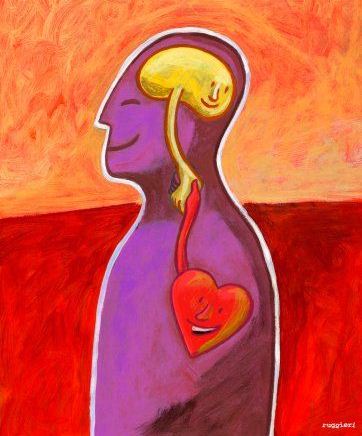
More and more evidence seems to show that the brain is hardwired for morality - but that is only a partial explanation, at least to me. Most of what they have found speaks to conventional moral perspectives - but is that what they are looking for or is that all there is in our brains? Has anyone tried to identify Kohlberg's moral stages in the brain?
This post comes from Mark Matousek at his Ethical Wisdom blog on the Psychology Today site.
From my perspective, some of the ideas he lists here sound fairly conventional. Yet he speaks of global awareness, which requires more of post-conventional consciousness and morality.
Are We Born to Be Wise?
The brain comes equipped with a hard-wired moral "organ"
It's interesting to learn that we are born with a five-part moral "organ" that helps us make ethical choices. Moral psychologists tell us that in spite of the fact that we can be competitive, greedy, dishonest,unfair, aggressive, philandering, power-hungry and slothful, we are also endowed with an ancient quintet of human concerns that have enabled our highly imperfect species to survive against the tremendous odds. These universal moral foundations appear to have remained the same throughout recorded history according to psychologist Jonathan Haidt, who first popularized this theory. From the Kung bushmen to a Boise soccer mom to a Japanese stock trader pounding the pavement, they are universal:
First, we're concerned with harm and care. As "communitarians under the skin" who survive by interconnection, and dislike seeing or feeling the pain of others, we have especially keen moral emotions related to threat as well as nurturing. This foundation underlies kindness and all forms of emotional and physical succor and protection.
Second, we're devoted to justice and fairness -- the rules of reciprocity, autonomy, reputation management, revenge, and punishment that enable us to live as individuals in groups. This foundation generates laws and rights and depends on an underlying, unavoidable, sometimes self-centered belief in just deserts.
Third, we depend on in-group loyalty for our survival. This foundation engenders patriotism, tribal pride, and self-sacrifice for the community; it's also why we automatically treat out-group members differently than our personal cohorts, and always worse. Loyalty is crucial to ethics, but in-group favoritism is also our nemesis as it underlies tribal conflict, war, and aggression.
Fourth, we care about authority and respect. As hierarchical animals with pecking orders to consider, we have a strong, instinctive attraction toward leadership and the respect of elders, as well as a reverence for tradition. This foundation is both an enormous help, as when "good" authority figures lead us to higher ground, and a moral hazard, as when power mongers dupe us with charisma or we allow ourselves to forgo ethics in favor of obedience to questionable people or causes.
Fifth, we have an innate, elevating need for purity and sacredness. This foundation, rooted in our central moral emotion - disgust -- turns us from animality toward the divine, and explains our perennial taste for religion (of which some forty thousand have been created to date). Like the other four moral receptors, this hunger for purity can be abused when an individual, nation, or faith plays on our disgust reflex by portraying enemies as morally impure, as in the case of anti-Semites and homophobes.
Learning to implement this ethical organ has never been more urgent. As the first generation to call ourselves "global," we stand at a moral crossroads. Luckily, our brain has provided us with higher angels to meet this challenge. Evolution is "thrifty and tinkering," after all, as biologist E. O. Wilson has written, and could be pushing our complex species toward a more benevolent future, in spite of what we read in the paper. This primordial sense of right and wrong -- hard wired into our brains when mastodons still pounded the earth -- may well be our ace in the hole.
Tags:

No comments:
Post a Comment